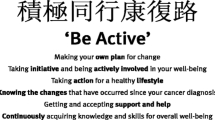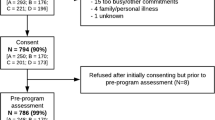Abstract
Little is known about cognitive changes among African American (AA) breast cancer survivors (BCS). Here, we report our experience with engagement of leaders of urban AA churches in Birmingham, Alabama to deliver and evaluate Think Well: Healthy Living to Improve Cognitive Function, an educational cognitive health program for BCS. The Think Well team engaged leaders of urban AA churches using a 7-step process: 1) identify leaders, 2) develop connection with leaders, 3) assess AA community preferences, 4) tailor for cultural relevance, 5) plan seminars, 6) deliver seminars, and 7) evaluate cultural relevance and overall program quality. Program evaluation was via a 22-item survey and sociodemographic questionnaire. Data from AA participants were analyzed using SPSS. The engagement process resulted in sustained partnerships with three urban AA churches and delivery of three Think Well seminars to 172 participants. Of the 172 participants, 138 (80%) AA participants (40 BCS, 98 co-survivors) returned the program survey. Respondents reported Think Well to be culturally relevant (90%) and of high quality (94%). Think Well was developed and evaluated with the collaboration of urban AA church leaders. Engaging church leaders facilitated reach of AA BCS. Partnership facilitated a culturally relevant, high quality program for AA BCS and co-survivors.
Similar content being viewed by others
References
American Cancer Society (2016) Cancer Facts & Figures for African Americans 2016–2018. American Cancer Society, Inc, Atlanta
Koppelmans V, Breteler MM, Boogerd W, Seynaeve C, Gundy C, Schagen SB (2012) Neuropsychological performance in survivors of breast cancer more than 20 years after adjuvant chemotherapy. J Clin Oncol 30(10):1080–1086
Ahles TA, Root JC, Ryan EL (2012) Cancer-and cancer treatment–associated cognitive change: an update on the state of the science. J Clin Oncol 30:3675–3686
Rust C, Davis C (2013) Chemobrain in underserved African American breast cancer survivors: a qualitative study. Clin J Oncol Nurs 17(2):E29–E34
Perkins GE, Brown TM (2014) Parallels and convergence of social engagement by social workers and the African American church. J Sociol 2(2):51–57
Harmon BE, Blake CE, Thrasher JF, Hébert JR (2014) An evaluation of diet and physical activity messaging in African American churches. Health Educ Behav 41(2):216–224
Harmon BE, Kim SH, Blake CE, Hébert JR (2014) Health care information in African American churches. J Health Care Poor U 25(1):242–256
Austin S, Harris G (2010) Addressing health disparities: the role of an African American health ministry committee. Social Work in Public Health 26(1):123–135
Levin J (2013) Engaging the faith community for public health advocacy: an agenda for the surgeon general. J Relig Health 52(2):368–385
Gisiger-Camata S, Adams N, Nolan TS, Meneses K (2016) Multi-level assessment to reach out to rural breast cancer survivors. Womens Health (Lond). doi:10.1177/1745505716678232
Adams N, Gisiger-Camata S, Hardy CM, Thomas TF, Jukkala A, Meneses K (2015) Evaluating survivorship experiences and needs among rural African American breast cancer survivors. J Cancer Educ 24:1–8
Ammerman A, Corbie-Smith G, St. George DM, Washington C, Weathers B, Jackson-Christian B (2003) Research expectations among African American church leaders in the PRAISE! Project: a randomized trial guided by community-based participatory research. Am J Public Health 93(10):1720–1727
Becker H, Henneghan A, Mikan SQ (2015) When do I get my brain back? Clin J Oncol Nurs 19(2):180–184
Haynes-Maslow L, Allicock M, Johnson LS (2016) Cancer support needs for African American breast cancer survivors and caregivers. J Cancer Edu 31(1):166–171
Bail J, Meneses K, Demark-Wahnefried W (2016) Nutritional status and diet in cancer prevention. Semin Oncol Nur 32(3):206–214
Acknowledgements
Think Well is supported by funding from Susan G. Komen, North Central Alabama Affiliate. Authors are supported by additional funding from the American Cancer Society Doctoral Degree Scholarship in Cancer Nursing (DSCN-15-073-01, DSCN-16-066-01) (TN, JB), Susan G. Komen Graduate Traineeship in Disparities Research Award (TN, JB, JV), Jonas Nurse Leaders Scholarship (TN), Robert Wood Johnson Foundation Future of Nursing Scholarship (JV), and Gladys Farmer Colvin Doctoral Fellowship (TN, JB).
Author information
Authors and Affiliations
Corresponding author
Rights and permissions
About this article
Cite this article
Bail, J., Nolan, T.S., Vo, J.B. et al. Engaging an Urban African American Community to Deliver Cognitive Health Education to Breast Cancer Survivors. J Canc Educ 33, 870–874 (2018). https://doi.org/10.1007/s13187-016-1155-6
Published:
Issue Date:
DOI: https://doi.org/10.1007/s13187-016-1155-6




